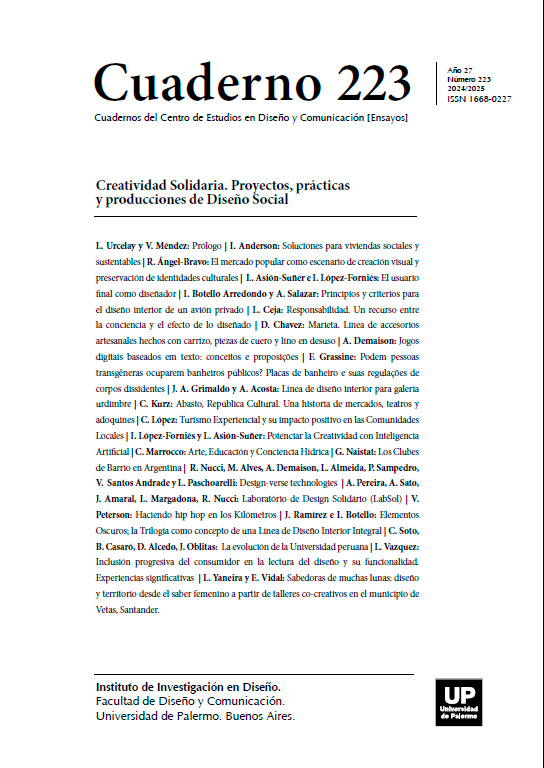El usuario final como diseñador.Un enfoque desde la industria
Palavras-chave:
design de produto, usuário final
Resumo
O modelo de consumo tradicional baseia-se numa economia linear onde a empresa gera um produto ou serviço para ser consumido pelo usuário final.
Referências
Asión-Suñer, L. (2022). El diseño modular en la creación de productos para prosumer (Universidad de Zaragoza). https://zaguan.unizar.es/record/119632?ln=es#
Asión-Suñer, L., & López-Forniés, I. (2020). Prosumer and Product Design Through Digital Tools. Lecture Notes in Mechanical Engineering, 23-30. https://doi.org/10.1007/978-3-030-41200-5_3
Asión-Suñer, L., & López-Forniés, I. (2021a). Adoption of Modular Design By Makers and Prosumers. A Survey. Proceedings of the Design Society, 1, 355-364. https://doi.org/10.1017/pds.2021.36
Asión-Suñer, L., & López-Forniés, I. (2021b). Analysis of Modular Design Applicable in Prosumer Scope. Guideline in the Creation of a New Modular Design Model. Applied Sciences, 11(22), 10620. https://doi.org/10.3390/app112210620
Bruns, A. (2009). From Prosumer to Produser: Understanding User-Led Content Creation. Chandler, J., & Chen, S. (2015). Prosumer motivations in service experiences. Journal of Service Theory and Practice, 25(2), 220-239. https://doi.org/10.1108/JSTP-09-2013-0195
Gershenson, J. K., Prasad, G. J., & Zhang, Y. (2003). Product modularity: definitions and benefits. Journal of Engineering Design, 14(3), 295-313. https://doi.org/10.1080/0954482031000091068
Gupta, J., & Vegelin, C. (2016). Sustainable development goals and inclusive development. INTERNATIONAL ENVIRONMENTAL AGREEMENTS-POLITICS LAW AND ECONOMICS, 16(3), 433-448. https://doi.org/10.1007/s10784-016-9323-z
Lastra, A. (2016). El poder del prosumidor. Identificación de sus necesidades y repercusión en la producción audioviusal transmedia. Revista ICONO14. Revista científica de Comunicación y Tecnologías emergentes, 14(1), 71. https://doi.org/10.7195/ri14.v14i1.902
Morgan, D. (2014). CAN FOLDING A PRODUCT FOSTER EMOTIONAL ATTACHMENT? En E. Bohemia, A. Eger, W. Eggink, A. Kovacevic, B. Parkinson, & W. Wits (Eds.), DS 78: PROCEEDINGS OF THE 16TH INTERNATIONAL CONFERENCE ON ENGINEERING AND PRODUCT DESIGN EDUCATION (pp. 456-460). 109 DUNDEE DRIVE, GLASGOW, G52 3HL, SCOTLAND: DESIGN SOC.
Rayna, T., Striukova, L., & Darlington, J. (2015). Co-creation and user innovation: The role of online 3D printing platforms. Journal of Engineering and Technology Management - JET-M, 37, 90-102. https://doi.org/10.1016/j.jengtecman.2015.07.002
Ritzer, G., Dean, P., & Jurgenson, N. (2012). The Coming of Age of the Prosumer. AMERICAN BEHAVIORAL SCIENTIST, 56, 379-398.
Sakthivelmurugan, E., Senthilkumar, G., & Karthick, K. N. (2022). Analysis of the impact of circular economy over linear economy in the paper processing industry. MATERIALS TODAY-PROCEEDINGS, 66(3), 1446-1452. https://doi.org/10.1016/j.matpr.2022.05.449
Sonego, M., Echeveste, M. E. S., & Galvan Debarba, H. (2018). The role of modularity in sustainable design: A systematic review. Journal of Cleaner Production, 176, 196-209. https://doi.org/10.1016/j.jclepro.2017.12.106
Val Fiel, M. (2016). Prosumer e impresión 3D: La democratización del proceso creativo / Prosumer and 3D printing: democratization of the creative process. Revista 180. Arquitectura, arte, diseño, (37), 17-22. https://doi.org/10.32995/REV180.NUM-37.(2016).ART-5
Wikipedia. (2021). Project Ara. 5 de noviembre de 2021, de https://en.wikipedia.org/wiki/Project_Ara
Asión-Suñer, L., & López-Forniés, I. (2020). Prosumer and Product Design Through Digital Tools. Lecture Notes in Mechanical Engineering, 23-30. https://doi.org/10.1007/978-3-030-41200-5_3
Asión-Suñer, L., & López-Forniés, I. (2021a). Adoption of Modular Design By Makers and Prosumers. A Survey. Proceedings of the Design Society, 1, 355-364. https://doi.org/10.1017/pds.2021.36
Asión-Suñer, L., & López-Forniés, I. (2021b). Analysis of Modular Design Applicable in Prosumer Scope. Guideline in the Creation of a New Modular Design Model. Applied Sciences, 11(22), 10620. https://doi.org/10.3390/app112210620
Bruns, A. (2009). From Prosumer to Produser: Understanding User-Led Content Creation. Chandler, J., & Chen, S. (2015). Prosumer motivations in service experiences. Journal of Service Theory and Practice, 25(2), 220-239. https://doi.org/10.1108/JSTP-09-2013-0195
Gershenson, J. K., Prasad, G. J., & Zhang, Y. (2003). Product modularity: definitions and benefits. Journal of Engineering Design, 14(3), 295-313. https://doi.org/10.1080/0954482031000091068
Gupta, J., & Vegelin, C. (2016). Sustainable development goals and inclusive development. INTERNATIONAL ENVIRONMENTAL AGREEMENTS-POLITICS LAW AND ECONOMICS, 16(3), 433-448. https://doi.org/10.1007/s10784-016-9323-z
Lastra, A. (2016). El poder del prosumidor. Identificación de sus necesidades y repercusión en la producción audioviusal transmedia. Revista ICONO14. Revista científica de Comunicación y Tecnologías emergentes, 14(1), 71. https://doi.org/10.7195/ri14.v14i1.902
Morgan, D. (2014). CAN FOLDING A PRODUCT FOSTER EMOTIONAL ATTACHMENT? En E. Bohemia, A. Eger, W. Eggink, A. Kovacevic, B. Parkinson, & W. Wits (Eds.), DS 78: PROCEEDINGS OF THE 16TH INTERNATIONAL CONFERENCE ON ENGINEERING AND PRODUCT DESIGN EDUCATION (pp. 456-460). 109 DUNDEE DRIVE, GLASGOW, G52 3HL, SCOTLAND: DESIGN SOC.
Rayna, T., Striukova, L., & Darlington, J. (2015). Co-creation and user innovation: The role of online 3D printing platforms. Journal of Engineering and Technology Management - JET-M, 37, 90-102. https://doi.org/10.1016/j.jengtecman.2015.07.002
Ritzer, G., Dean, P., & Jurgenson, N. (2012). The Coming of Age of the Prosumer. AMERICAN BEHAVIORAL SCIENTIST, 56, 379-398.
Sakthivelmurugan, E., Senthilkumar, G., & Karthick, K. N. (2022). Analysis of the impact of circular economy over linear economy in the paper processing industry. MATERIALS TODAY-PROCEEDINGS, 66(3), 1446-1452. https://doi.org/10.1016/j.matpr.2022.05.449
Sonego, M., Echeveste, M. E. S., & Galvan Debarba, H. (2018). The role of modularity in sustainable design: A systematic review. Journal of Cleaner Production, 176, 196-209. https://doi.org/10.1016/j.jclepro.2017.12.106
Val Fiel, M. (2016). Prosumer e impresión 3D: La democratización del proceso creativo / Prosumer and 3D printing: democratization of the creative process. Revista 180. Arquitectura, arte, diseño, (37), 17-22. https://doi.org/10.32995/REV180.NUM-37.(2016).ART-5
Wikipedia. (2021). Project Ara. 5 de noviembre de 2021, de https://en.wikipedia.org/wiki/Project_Ara
Publicado
2024-05-02
Como Citar
Asión-Suñer, L., & López-Forniés, I. (2024). El usuario final como diseñador.Un enfoque desde la industria. Cuadernos Del Centro De Estudios De Diseño Y Comunicación, (223). https://doi.org/10.18682/cdc.vi223.11172
Seção
Artículos
Los autores/as que publiquen en esta revista ceden los derechos de autor y de publicación a "Cuadernos del Centro de Estudios de Diseño y Comunicación", Aceptando el registro de su trabajo bajo una licencia de atribución de Creative Commons, que permite a terceros utilizar lo publicado siempre que de el crédito pertinente a los autores y a esta revista.


